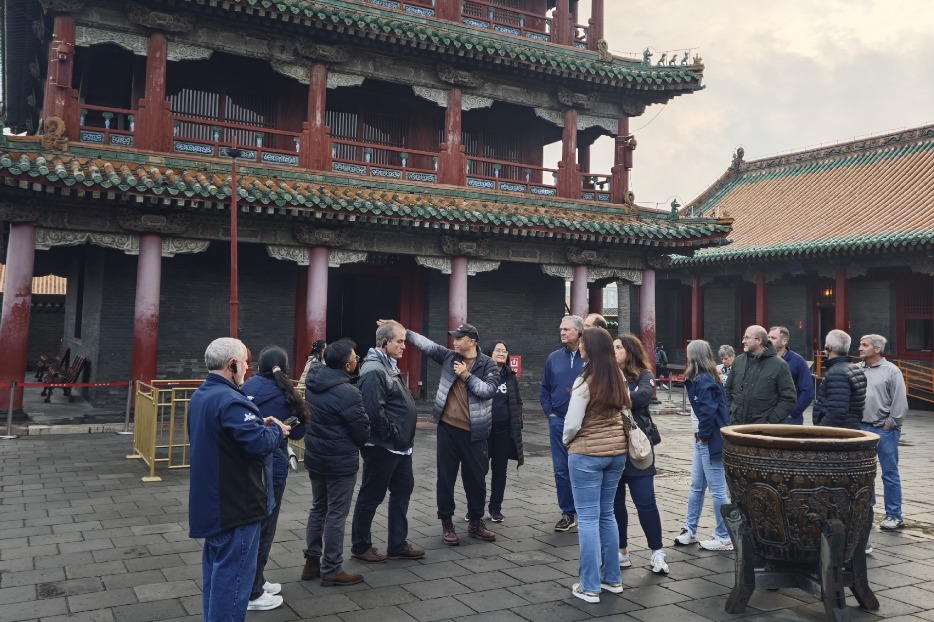Chinese Development and Advancements

China Expands Economic Horizons with Tourism, Technology, and Trade Initiatives
In a series of strategic moves, China is reinforcing its position as a global economic leader through initiatives aimed at boosting tourism, advancing technological capabilities, and expanding trade partnerships. These efforts, detailed in recent reports, showcase China's commitment to stimulating domestic demand, fostering international cooperation, and driving economic growth.
Tourism Boost with Instant Tax Refunds
To attract more international visitors, China has implemented a nationwide expansion of its instant tax refund initiative. Announced on April 18, 2025, this policy allows foreign travelers to claim immediate tax rebates on their purchases at participating retail outlets. By simplifying the refund process through credit card pre-authorization, China aims to enhance the shopping experience for tourists and increase consumer spending in the retail sector.
This initiative aligns with China's goal of becoming a more appealing destination for international tourists, particularly as the global economy faces challenges such as trade tensions. The streamlined system reduces friction associated with tax rebates, encouraging visitors to spend more and promoting the demand for luxury and local goods. This strategic move is expected to support economic recovery and growth by attracting a larger influx of foreign visitors.
Deep-Space Exploration and Technological Advancements
China has achieved a significant milestone in deep-space exploration by successfully deploying the world's first three-satellite constellation in the distant retrograde orbit (DRO) of the Earth-moon system. Scientists announced this achievement at an academic symposium in Beijing, highlighting the country's advanced capabilities in space technology.
The DRO-A/B satellites, developed under the Chinese Academy of Sciences' “DRO Exploration” program, have linked with the previously launched DRO-L satellite in low-Earth orbit, forming an interconnected network after traveling 8.5 million kilometers. This system positions China at the forefront of DRO utilization, a strategic orbital region considered a “natural spaceport” for future lunar and deep-space missions.
Wang Wenbin, a CAS researcher and chief architect of the program, emphasized that DRO's unique position allows spacecraft to enter Earth-moon space with minimal energy expenditure while maintaining stable positioning and full-domain accessibility. The three-satellite system provides essential navigation, communication, and logistical support for activities such as building future lunar bases, deep-space observatories, and interplanetary mission support stations.
The program overcame technical challenges, including an upper-stage rocket anomaly during the launch of DRO-A/B in March of the previous year. Engineers successfully executed multiple emergency orbital adjustments over four months to salvage the mission. Innovations such as K-band inter-satellite communication across 1.17 million kilometers and a novel satellite-to-satellite-tracking orbital determination system were validated through the constellation.
Globalization and Free Trade Initiatives
As the United States engages in tariff wars, China is reinforcing partnerships with key economies around the world to boost globalization and free trade. Zhang Yansheng, a researcher at the Chinese Academy of Macroeconomic Research, noted that the U.S. is attempting to disrupt the global trade order by imposing tariffs on numerous trading partners.
In response, China is focusing on expanding domestic demand and widening its opening-up policy, positioning itself as a shared market for the rest of the world. Zhang emphasized the importance of increasing people's incomes and strengthening the social security system to alleviate public burdens, thereby ensuring a coordinated approach to bolstering domestic demand.
China is also engaging more with the European Union, Japan, South Korea, and the Association of Southeast Asian Nations to uphold the multilateral trading system and global cooperation. Chinese Commerce Minister Wang Wentao has held video calls with high-ranking officials from Brazil, South Africa, Saudi Arabia, the European Union, and ASEAN to discuss enhancing economic and trade cooperation.
The global community is encouraged to promote inclusive international trade, ensuring that prosperity is shared equitably among all nations.
Rural Revitalization Through E-Commerce and Technology
A digital transformation is sweeping across rural China, empowering farmers with smart technology to improve productivity and boost their incomes. In Huashan Village, Heilongjiang Province, Chen Lili is livestreaming the latest rice harvest, connecting with customers nationwide using her smartphone. After leaving her urban career in Beijing, Chen returned to her hometown and began documenting her journey from city life to rural entrepreneurship, attracting over one million followers.
Chen's success extends to signing rice procurement contracts with local farmers, encouraging them to grow higher-quality rice varieties and guaranteeing the buyback of the harvest at promised prices. This program has benefited numerous farming households, increasing their collective income significantly.
In the mountainous village of Xigui, Yunnan Province, drones and digital platforms are modernizing the traditional tea industry. Drones transport freshly picked tea leaves to the processing center, reducing the time it takes to carry them down the mountain from an hour to just three minutes. This innovation has significantly reduced the loss rate for fresh leaves, improving the flavor and quality of the tea.
Tea grower Cheng Benfu is also using livestreaming to sell tea, showcasing fresh tea leaves and brewing techniques to customers who can watch the production process in real-time. The integration of livestreaming and drone delivery improves efficiency, opens new sales channels, and reduces waste.
Expanding and Upgrading Domestic Services
China has released new measures aimed at expanding and upgrading consumption in the domestic services sector, as part of broader efforts to stimulate domestic demand. The guidelines, jointly issued by the Ministry of Commerce and eight other departments, focus on improving the quality of domestic services, making services more accessible to consumers, enhancing policy support, and fostering a better consumption environment.
The document encourages domestic service enterprises to explore emerging areas and integrate with industries like home renovation and furnishing. It also calls for leveraging community-based service outlets to deliver tailored services to meet personalized demand, including shared housekeeping, cooking, and child pick-up services. Additionally, the guidelines stress improving the employment environment for domestic service workers.
AI and Robotics in Agriculture
Innovative technologies are transforming tea cultivation and harvesting. This year's Longjing tea harvest was slightly delayed due to a cooler than average spring, but tea connoisseurs can still look forward to reveling in the aroma of spring tea, thanks to the addition of robots to the traditional tea-picking workforce.
These mechanical assistants use artificial intelligence to automatically identify tea buds and leaves through vast amounts of image data. The latest version of these machines can handle the workload of 1.5 human workers. Additionally, comprehensive intelligent monitoring stations predict pest trends and monitor meteorological and soil data in real-time, ensuring optimal tea plant growth while addressing environmental concerns through rational irrigation and scientific fertilization.
Drones are also being used to create terrain databases for Longjing tea fields and visually track pesticide spraying, enabling eco-friendly pest control. The application of AI in agriculture has expanded rapidly, highlighting the government's efforts to modernize its agricultural sector and accelerate rural revitalization.
Cultural Exchange Through Film
The 2025 Chinese Film Week kicked off in Phnom Penh, Cambodia, bringing Cambodian people the best of recent Chinese films across various genres and themes. The event, which opened with the animated film “I Am What I Am 2,” will run through April 21. This cultural exchange aims to share creativity, strengthen friendship, and promote solidarity between Cambodia and China.
Trade Expansion Through Bonded Zones
China’s comprehensive bonded zones are playing a crucial role in expanding trade, attracting foreign investment, and driving industrial upgrades. A truck loaded with clothing, hats, sunglasses, and other goods departed from the cross-border e-commerce warehouse at the comprehensive bonded zone of Beijing Daxing International Airport, heading to Tashkent in Uzbekistan. Comprehensive bonded zones are customs-supervised areas with streamlined clearance procedures, serving as vital platforms for China's opening-up endeavors.
Policies such as tax refunds upon entry, bonded imports, and the free flow of goods within the zone help enterprises significantly reduce institutional transaction costs. The bonded zone at Beijing Daxing International Airport saw its foreign trade value grow by fourfold in the previous year, encouraging more enterprises to settle there to boost regional foreign trade. Bonded zones are also accelerating industrial transformation, leveraging policies to establish R&D centers and foster high-tech industries.
In conclusion, China's multifaceted approach to economic development, encompassing tourism, technological innovation, trade expansion, rural revitalization, and cultural exchange, underscores its commitment to sustainable growth and global cooperation.










